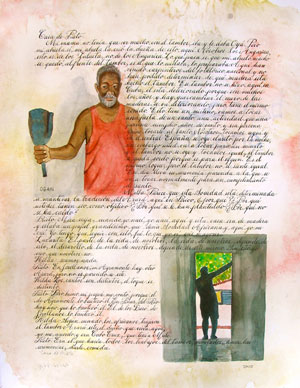Casa de Prieto (2010)

Sumi Ink, metal leaf, and watercolor on paper, 17" X 22"
Prieto Angarica with Hilda Zulueta and Melba Núñez Isalbe, January 2006, Perico, Cuba.
Prieto: Mi mamá no tenía que ver mucho con el tambor, ella iba y le daba Oyá. Pero mi abuela si, mi abuela la crió la dueña de esto aquí. Nosotros los Angarica, esto es de los Zulueta no de los Angarica, lo que pasa es que mi abuelo macho se quedó al frente del tambor, es el que lo cuidaba, lo preparaba. Aquí han venido carpinteros del folklórico nacional y no han podido determinar de qué madera está hecho el tambor. Ese tambor no se hizo aquí en Cuba, él está deteriorado porque son muchos los años y hay que cambiar el cuero de las maderas se va deteriorando, pero tiene el mismo sonido. Eso tiene un misterio, vamos a tocar una fiesta de un santo, una actividad que una persona cumplió años de santo y esa persona quiere tocarle al santo. Nosotros tocamos aquí y en el central España se oye clarito por la noche, sin embargo usted va a tocar para un muerto y el tambor no se oye y tocamos igual, el tambor se queda sordo porque es para el eggun. Es el mismo toque, pero el tambor no se siente igual. Ese día lleva su ceremonia parecida a la que se va a tocar normalmente para un cumplimiento de santo…
Melba: parece que esta Sociedad está determinada a mantener la tradición del Arará aquí en Perico, ¿por qué? ¿Por qué ustedes tienen eso como objetivo?, ¿por qué se le han planteado?, ¿por qué no se ha caído?
Prieto: mira mija, cuando yo nací, yo nací aquí y esto era de madera y estaba un papel grandísimo que decía Sociedad Africana y aquí yo me crié. Yo tengo que seguir con esto, fue lo que yo vi, mis mayores…
Lazarita: es parte de la vida de nosotros, la vida de nosotros depende de esto, el desarrollo de la vida de nosotros depende de esto mismo. Sin esto yo creo que nosotros no…
Hilda: seremos nada
Prieto: en Jovellanos, en Agramonte hay otro, pero no es parecido a este
Hilda: los cantos son distintos, el toque es distinto
Prieto: pero bueno mi papá me contó porque el de Agramonte lo bautizó él. En Pinar del Río hay uno que lo bautizó él. El de los Baró de Jovellanos lo bautizó él
Hilda: según cuando los africanos trajeron el tambor Arará este el dueño que vivía aquí, yo me acuerdo y era Cabo cruz, que tenía Malé
Prieto: era el que hacía todos los trabajos del tambor, montarlos, hacer las ceremonias, darle comida.
Prieto: My mother was not that involved with ceremonies. She used to go, and Oyá possessed her. But my grandmother, yes. My grandmother was brought up by the person in charge of all this. We, the Angarica, because this belongs to the Zulueta not to the Angarica, my grandfather, Macho was responsible for the drums, he used to take care of them, prepare them. We have had carpenters come here from Conjunto Folklórico and they couldn't determine the wood those drums were made of. They were not made here in Cuba. They are damaged because they are old, and we have to change the skin, and wood decays, but they have the same sound. They also have a mystery. If we play for a deity, a celebration, we play here in Perico, and you hear them in España (the refinery) quite clearly at night. However if we play for an 'eggun' (dead ancestor) you don't hear them, although we play the same way. They remain silent because we are playing for 'egguns' (the dead). It's the same beat, but you don't feel it the same way. On that day the ceremony is pretty close to the way we play for a birthday celebration…
Melba: It seems that this Society is determined to maintain Arará traditions here in Perico. Why? Why is this an objective? Why do you want to keep your traditions?
Prieto: Look, when I was born, and I was born here, this house was made out of wood, and I saw a huge sign that read African Society. I was brought up here. I have to keep on with this, this is what I've always seen, my elders…
Lazarita: It is part of our lives, our lives depend on this, and the contiunation of our lives depends on this. Without it I don't think we…
Hilda: would be worth anything.
Prieto: In Jovellanos and Agramante they also have Arará, but it's not like this.
Hilda: The chants are different, the rhythm is different.
Prieto: But, well, my father told me he baptized in Agramonte. In Pinar del Rio he babtized. Also, the Baro's in Jovellanos, he baptized there.
Hilda: According to Africans, when these drums came here, the owner used to live here, his name was Cabo Cruz, and he was consecrated with Malé.
Prieto: He did everything for those drums, set them up, did the ceremonies, and fed them.









